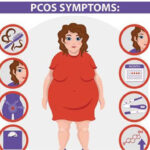Although Polycystic Ovarian Syndrome is the most frequent gynaecological endocrine illness in women of reproductive age, its prevalence and management in Nigerian women is barely discussed. Daily Trust on Sunday spoke to a few women who shared their ordeal with PCOS.
Aisha Wakili is a 24-year-old lady who has been living with Polycystic known as PCOS, for short. Ovarian syndrome. Ever since her diagnosis at the age of 20, Aisha has had to make certain lifestyle changes in a bid to manage her symptoms.
- EU, INEC, others organise musical concert on voters’ sensitisation
- Ahead Of APC Primary: Buhari Pushes For Consensus As Northern Govs Back Southern Presidency
“Life with PCOS isn’t something I’d wish on any woman. I suffered from symptoms such as abnormal weight gain, infertility, hirsutism, irregular periods and fatigue.
“Because there is no cure for PCOS, I had to make adjustments to my lifestyle. I had to cut down on carbohydrates and fatty foods. I now only eat mostly vegetables and other natural foods. I started exercising regularly, at least an hour or two every day in a bid to maintain my weight and also began to prioritise my sleep more.”
Living with PCOS has not been an easy ordeal for Aisha. Considering some usual symptoms which normally come with PCOS, Aisha mentions that her personal life has been affected in so many ways.
She told Daily Trust on Sunday that; “Living with PCOS is a day-to-day struggle for me. It has affected me in so many ways, especially with the mood swings I’ve had and also with a miscarriage.”
Although there is no medication for PCOS. Aisha has found a way to make things much easier for her.
“The only treatment available involves making changes to one’s lifestyle habits. Also taking supplements that will balance and help replenish lost vitamins, nutrients and hormones,” she added.
PCOS (polycystic ovarian syndrome) is a hormonal condition that can affect women during their reproductive years (ages 15 to 44). It affects women’s ovaries, which produce oestrogen and progesterone – hormones that govern the menstrual cycle. A tiny number of male hormones termed androgens are also produced by the ovaries.
In a two-year study of women with polycystic ovaries examined by two large infertility clinics in Enugu, South East Nigeria, it was discovered that 342 women presented with infertility in the centres, with 62 of them having PCOS.
PCOS was found in 18.1 per cent of women in the two universities’ infertility clinics. Infertility affected 52 (83.9 per cent), oligomenorrhoea affected 45 (72.6 per cent), obesity affected 32 (51.6 per cent), hyperprolactinaemia affected 26 (41.9 per cent) and hirsutism affected 19 (30.6 per cent) women.
Habiba Lawal is another Nigerian woman who is dealing quietly with PCOS. Habiba is currently 34 but was diagnosed with PCOS in her early 20s. Similar to Aisha, she suffered certain symptoms due to PCOS.
“When I was diagnosed with PCOS, some of the symptoms I encountered were irregular periods, a lot of mood swings, I was fatigued too and also suffered from acne and insomnia.
“After discovering I have PCOS, one of the firsts changes I made was to my diet. I often had to plan different special diets and also included seeds such as sesame, flaxseed, pumpkin and sunflower seeds to my diet. I also started exercising,” she added.
Habiba also mentioned that; “I can tell you that living with PCOS isn’t the easiest thing to do. People always think once you make the lifestyle changes, the problem will go but that isn’t it at all. Each day, you have to constantly remind yourself why the meals and other things you might crave are a danger to your health.”
Another lady, Vivian Mbah, 35, who has been diagnosed said her symptoms were quite severe as compared to milder symptoms that others may experience.
“I found out I had PCOS at the age of 21. The symptoms I faced then were quite severe and bothered me, which led me to running test and getting the PCOS diagnosis. As at the time, I was suffering from a bit of hair loss on the head while growing a lot of hair on my face.
“My periods were so irregular. Sometimes even before my period date was due, I would experience heavy bleeding,” she added.
Just like others, Vivian was encouraged to make lifestyle changes such as sticking more to a vitamin rich diet and exercising. She said that “After diagnosis, I was told that for women with PCOS, it wasn’t advisable to consume meals that were high in carbs rather I should eat foods that are rich in vitamin such as vegetables, fruits, avocados.
“Most women with PCOS are advised to exercise more. Reason being that PCOS can also lead to metabolism disorders such as diabetes and could also cause high blood pressure. Hence the reason to dedicate at least one hour or more to exercising,” she added.
Vivian however said regardless of having to stick by a diet and exercise, PCOS has affected her life in many ways. She said the constant mood swings can be very annoying because even the people around wouldn’t know when to come near you or how best they can help you.
“Also, having to constantly shave my chin and wax my face is something I’m really tired of. Being a woman with a beard isn’t an easy ordeal for anyone to bear. Every time I walk into place, people would be asking what I’ve done to get rid of the hairs when in reality, there’s really nothing I can do.
“Let’s not even talk of the unexpected weight gain despite sticking to a no carb diet all week long. There are times when I’d climb the scale and realise I’ve added an extra 2 or 3 kg even when all I’ve had is a salad bowl and fruits. “Losing weight is not something that comes easy for me and having PCOS worsens the situation. Because of the weight gain, I’ve often been told that I look older than my age and it saddens me,” she added.
In an interview with Daily Trust on Sunday, consultant gynaecologist at the University of Abuja Teaching Hospital, Dr Nathaniel Adewole, said that often times some PCOS patients may be prescribed hormonal drugs to create a balance in their system, but it’s not a permanent solution.
“For people who may experience irregular menstruation, in some situations they might be given hormonal drugs but in the long run, it’s not something you’d want to stand by. However, women who experience irregular breast milk discharge will have to visit a gynaecologist and have the appropriate drugs prescribed to them,” he said.
Dr Adewole noted that with the increase in internet use by a lot of female teens, many have now been able to learn and identify symptoms that come with PCOS which in return leads to early diagnosis and also lifestyle changes.
He said; “A lot of women who come in for check-up are now familiar with PCOS symptoms and what lifestyle changes they will have to make. Most times, they just come in to confirm the diagnosis”
Adewole also posited that the reason why most PCOS patients are encouraged to eat healthy is because they are most likely to become obese and a high BMI will not just irritate the PCOS symptoms but also cause more risk to the person’s health.
“People are encouraged to eat healthier as eating foods high in carbs could lead to obesity (since most PCOS patients are exposed to excessive weight gain). Their diet has to be under control. Also, obesity will expose them to other health issues,” he said.
Dr Adewole also advised that women who suffer infertility as a result of PCOS should organise occasional visits to their gynaecologist and could also opt for ovulation induction as a means to get pregnant.

 Join Daily Trust WhatsApp Community For Quick Access To News and Happenings Around You.
Join Daily Trust WhatsApp Community For Quick Access To News and Happenings Around You.


